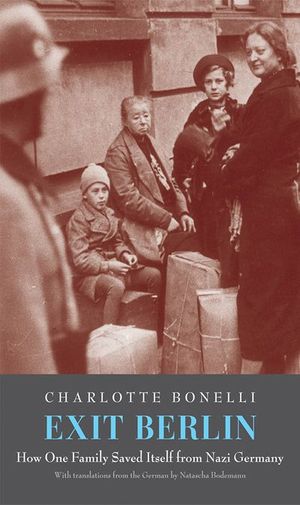Exit Berlin
Published by Yale University Press
Centered around one family’s preserved personal letters, this is “an intimate, engaging examination of the plight of German Jewish refugees” (Kirkus Reviews).
Just a week after the Kristallnacht terror in 1938, young Luzie Hatch, a German Jew, fled Berlin to resettle in New York. Her rescuer was an American-born cousin and industrialist, Arnold Hatch. Arnold spoke no German, so Luzie quickly became translator, intermediary, and advocate for family left behind. Soon an unending stream of desperate requests from German relatives made their way to Arnold’s desk.
Luzie Hatch faithfully preserved her letters both to and from far-flung relatives during the World War II era as well as copies of letters written on their behalf. This extraordinary collection, now housed at the American Jewish Committee Archives, serves as the framework for Exit Berlin. Charlotte R. Bonelli offers a vantage point rich with historical context, from biographical information about the correspondents to background on U.S. immigration laws, conditions at the Vichy internment camps, refuge in Shanghai, and many other topics, thus transforming the letters into a riveting narrative.
Arnold’s letters also reveal an unfamiliar side of Holocaust history. His are the responses of an “average” American Jew, struggling to keep his own business afloat while also assisting dozens of relatives trapped abroad—most of whom he’d never met and whose situation he could not fully comprehend. This book contributes importantly to historical understanding while also uncovering the dramatic story of one besieged family confronting unimaginable evil.
“Has as much to teach readers about today’s world, which is filled with war and displacement, as it does about the world of the 1930s.” —Kirkus Reviews
“For a generation steeped in email, this heartrending collection of letters takes us to a more intimately communicative era―in which Jews, trapped in the nightmare of Hitler’s persecution, pleaded for help to escape to their cousins in America; and in which the latter tried desperately, generously, to respond.” —Michael R. Marrus, author of The Holocaust in History
Just a week after the Kristallnacht terror in 1938, young Luzie Hatch, a German Jew, fled Berlin to resettle in New York. Her rescuer was an American-born cousin and industrialist, Arnold Hatch. Arnold spoke no German, so Luzie quickly became translator, intermediary, and advocate for family left behind. Soon an unending stream of desperate requests from German relatives made their way to Arnold’s desk.
Luzie Hatch faithfully preserved her letters both to and from far-flung relatives during the World War II era as well as copies of letters written on their behalf. This extraordinary collection, now housed at the American Jewish Committee Archives, serves as the framework for Exit Berlin. Charlotte R. Bonelli offers a vantage point rich with historical context, from biographical information about the correspondents to background on U.S. immigration laws, conditions at the Vichy internment camps, refuge in Shanghai, and many other topics, thus transforming the letters into a riveting narrative.
Arnold’s letters also reveal an unfamiliar side of Holocaust history. His are the responses of an “average” American Jew, struggling to keep his own business afloat while also assisting dozens of relatives trapped abroad—most of whom he’d never met and whose situation he could not fully comprehend. This book contributes importantly to historical understanding while also uncovering the dramatic story of one besieged family confronting unimaginable evil.
“Has as much to teach readers about today’s world, which is filled with war and displacement, as it does about the world of the 1930s.” —Kirkus Reviews
“For a generation steeped in email, this heartrending collection of letters takes us to a more intimately communicative era―in which Jews, trapped in the nightmare of Hitler’s persecution, pleaded for help to escape to their cousins in America; and in which the latter tried desperately, generously, to respond.” —Michael R. Marrus, author of The Holocaust in History
BUY NOW FROM
COMMUNITY REVIEWS
